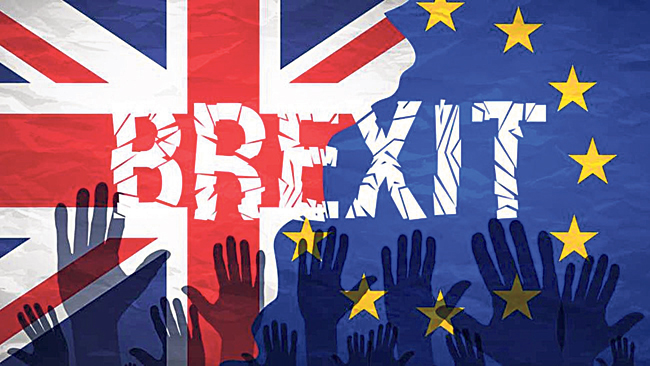
OR

The losing parties of both these campaigns grossly underestimated the sense of public anger and frustration in their respective countries.
The year 2016 has thrown up two unpredictable shocks – some may even call them unpleasant specially if they happened to be sitting on the wrong side of the fence on either of those events.
First the UK voted for Brexit and now America, in a toss-up between the unpalatable and downright scary, opted for the latter by choosing Donald Trump as their president. Many people likened it to America’s version of Brexit even before the elections and it’s easy to see why comparisons are being made. These campaigns had more in common than the negative effects of their results on world markets.
For starters, both of these voting exercises were supposed to be foregone conclusions just as long as the ‘Remain’ campaign in the UK and Hillary Clinton in the US didn’t mess up too badly. But as the public voted and the results became clear, they turned into the sort of upsets that will reverberate globally for years to come.
While the leaders of the ‘Leave’ EU campaign only half expected to win, hoping instead to end up as glorious losers having furthered their political careers, it was a similar story across the pond in the US. Donald Trump, for all his boasts of being a ‘winner’, didn’t really think he could pull it off or more accurately didn’t think the establishment would let him pull it off and this was illustrated by his comments when queried whether he would accept the results of the vote or not.
Trump’s achievement is arguably the bigger of the two shocks – he said it would be Brexit plus plus – because while the British politicians of all stripes that were allied to the ‘Remain’ campaign, Jeremy Corbyn, Theresa May and others, can be (and have been) accused of not giving their all to the campaign before the referendum, the same cannot be said for Hillary Clinton who pulled out all the stops – celebrities, former presidents, political heavyweights – and yet failed to beat Trump.
In the end, by virtue of Hillary winning the popular vote in America and the referendum being decided by a slim majority in the UK, both these countries were left with large swathes of the population in disbelief and struggling to come to terms with the events that had just transpired, with some even refusing to accept the results and others indulging in name calling voters or demographics who voted for the other side.

The losing parties of both these campaigns grossly underestimated the sense of public anger and frustration in their respective countries. For the British, it largely centered around the themes of unchecked immigration and a sense of eroding control over their country and it’s affairs to the bureaucratic behemoth that is the EU. In the American election, while the voters also grappled with issues of immigration, there was also collective disillusionment with the political establishment (as embodied by Hillary Clinton), liberalism, and prosperity brought about by economic change that had left behind significant numbers in middle America, away from the coastal urban areas.
All of this rage was evident from the time Trump was running for the Republican nomination and Clinton was battling it out with Bernie Sanders for the democratic one. The voters wanted a change in the status quo and Trump represented that – for good or worse they did not care.
The winning sides of both these campaigns did not cover themselves in glory either. A common feature (or a new low some might say), of the winning sides in these two campaigns has been their use, or rather their misuse, of information.
Information has often been twisted or spun or selectively employed to suit their needs, and if they said it loudly and repeated it frequently enough it was somehow perceived as being true.
In Brexit, the iconic poster on the side of a bus claiming that the UK was ‘sending the EU £350 million a week’ embodied the lies and misinformation that was a hallmark of the ‘Leave’ campaign. Over in the US, many of Donald Trump’s assertions were so inaccurate, so frequent, and often so outlandish that fact checking became completely irrelevant. And this is even before touching on his many conspiracy theories. It was this propensity of his that led the Washington Post to label Donald Trump as a candidate who seemed ‘uniquely undeterred by facts.’
But in the end, for both countries on either side of the Atlantic, the voters were just fed up with the current state of affairs and had had enough of being told what the ‘right’ thing to do was. It was almost like telling your kids that they are not supposed to do something and then they go and do exactly that, either out of curiosity or defiance.
No doubt these polls have changed both countries forever, not least because the campaigns leading up to them succeeded in highlighting deep-seated divisions in the two countries. In the UK, for example, where anti-immigration sentiments once bubbled under the surface, hostility towards foreigners has come out into the open and, in many instances, those indulging in it seemed to see their actions as justifiable in light of the results of the referendum. It’s still too early to tell what will happen in the US as the fallout of this election will unfold over days, months, and years but from the looks of it, it definitely ain’t going to be pretty.
The writer loves traveling, writing, and good food when he is afforded an escape from the rat race. He can be contacted @ gunjan.u@gmail.com
You May Like This

Daring to draw
Four years ago, Ketan Maharjan never thought he would become a graphic designer. Sure, he liked drawing, loved it even.... Read More...

Terms of upper house members to be decided by drawing lots
KATHMANDU, June 11: The term of the lawmakers of National Assembly is set to be determined by drawing lots on June... Read More...

Timbu Pokhari drawing more tourists
TIMBU POKHARI, Sept 13: Timbu Pokhari, the famous touristic destination in eastern Nepal, attracts thousands of trekkers annually. There has... Read More...

Just In
- Indians vote in the first phase of the world’s largest election as Modi seeks a third term
- Kushal Dixit selected for London Marathon
- Nepal faces Hong Kong today for ACC Emerging Teams Asia Cup
- 286 new industries registered in Nepal in first nine months of current FY, attracting Rs 165 billion investment
- UML's National Convention Representatives Council meeting today
- Gandaki Province CM assigns ministerial portfolios to Hari Bahadur Chuman and Deepak Manange
- 352 climbers obtain permits to ascend Mount Everest this season
- 16 candidates shortlisted for CEO position at Nepal Tourism Board






_20220508065243.jpg)











Leave A Comment